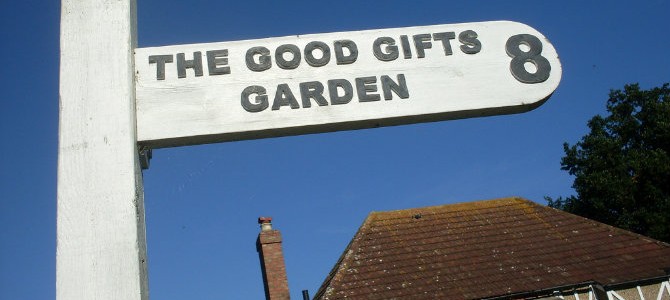Community growers raise funds as well as foods
by

Credit: London Permaculture
City farms and community gardens do sterling work; they provide access to nature, community hubs, places to grow and learn about healthy food, work experience, and therapeutic rehabilitation and recreation for people of all ages - and the movement is growing. No one has a duty to provide funding for these voluntary organisations, so in the current economic climate, ingenuity is required to generate income. FCFCG (The Federation of City Farms and Community Gardens) tells us how some of their members have been trying to plug the funding gap:
Fund- raising activities appear in many different guises and can range from the prosaic to the rather more glamorous - Freightliners Farm in Islington (www.freightlinersfarm.org.uk/) for example, held a special comedy benefit night featuring Alan Davies and Jimmy Carr amongst others, with all profits going to the farm.
A different kind of digging
DIG - Digital Income Generation (supported by FCFCG’s Growing Together initiative) –is increasingly being used by city farmers and community gardeners who are taking advantage of social media and online opportunities like crowd-funding to raise money to start up, provide services or simply to stay in existence.
Stepney City Farm and Rural Arts Centre, London has already raised over £20,000 towards its target of £25,000 through a crowd-funding campaign, so it can continue to open to the public this year. www.stepneycityfarm.org/
Herts & Essex Community Farm has raised £5000 start-up funding, while School Farm Community Supported Agriculture in Totnes has managed to raise nearly £7,000 in its campaign to secure more land and so double the number of members who commit their support for a growing season, in return for a weekly share of the harvest and involvement in the farm. www.schoolfarmcsa.org.uk/
Using social media can raise the requisite subsidies in other ways too- Bill Quay Community Farm, near Gateshead, was under threat of closure, but the farm mobilized support through a media campaign which persuaded the council to step in and give the farm funding to keep it going. www.billquayfarm.org.uk/
Branching out - growing and selling
You’d be surprised by the range of things you can buy at your local community growing space. As you’d expect the gardens are making the most of the produce, plants and seeds they grow on site and selling these to their local communities but they are selling much else besides.
Coplow Street Grow Site in inner-city Birmingham buys plug plants in the spring and sells them on at a profit once they get bigger, as well as using the plants to make hanging baskets which are also for sale.
Watch Us Grow in Cumbernauld-Scotland (www.watchusgrow.org.uk/ ) not only sells organic vegetables, herbs and plants grown in its gardens at Palacerigg Country Park, but also trades in recycled baby goods, nursery equipment and a variety of arts and crafts materials through its Nursery Needs project.
Meanwhile other organisations are exploiting the specialist skills of their volunteers, be it spoon-carving or blacksmithing, to sell something different - for example apple juice and cider are offered through local bars and pubs in Nottingham, made by expert volunteers with their press and apple scratter based at Summerwood Community Garden. www.summerwood.org.uk/
Cultivating skills
Want to learn bee keeping, basket weaving, looking after fruit trees? Some community growers are offering courses, training and events to make money, like Urban Veg in Birmingham who provide a variety of courses they charge for, including the above. They also help to train apprentices at their base at Winterbourne House and Garden and they trained the new Library of Birmingham volunteers too. www.winterbourne.org.uk/
Hammersmith Community Gardens Association offers corporate volunteering days and team challenges for business and works with a range of companies including JP Morgan, HSBC, BBC, Bet Fair and Timberland www.hcga.org.uk/
Grants to flourish in the future
With traditional grant funding hard to secure and more competition for funds, community growers have been resourceful in bidding for grants and in building projects which will survive once the funding has gone.
Spitalfields City Farm London gained one year funding from the Heritage Lottery Fund for its Rare Breeds in the City project, which it used to buy two rare breeds of sheep (North Ronaldsay and Castlemilk Moorit) and several breeds of chicken, plus the feed and equipment to keep them. The Farm has successfully bred the animals and increased their numbers and has also published a book about the project, Rare Breeds in the City, which is now on sale. The local community come in and learn about the animals which are looked after by disadvantaged young people from East London www.spitalfieldscityfarm.org/
Get-Growing is Cwm Harry’s three year lottery-funded project to support food-growing initiatives in community gardens based in Newtown, Llanidloes and Llanfyllin in Powys, Wales. Get-Growing aims to establish enterprises such as a forest and wildlife garden plant nursery, raised bed production, horticulture training and local food distribution hubs which have the potential to continue development when the funding stops . www.get-growing.org.uk/
And…
Charitable trusts, local businesses, local authorities, donors at events, animal sponsors and others have all been invited to contribute to the flow of funds. FCFCG is also looking at whether direct donations, legacies and fundraising support from individuals could help. However, raising money is not likely to get easier any time soon, so if you would like to volunteer or help support your local city farm or community garden, then check out the website of FCFCG at www.farmgarden.org.uk/




